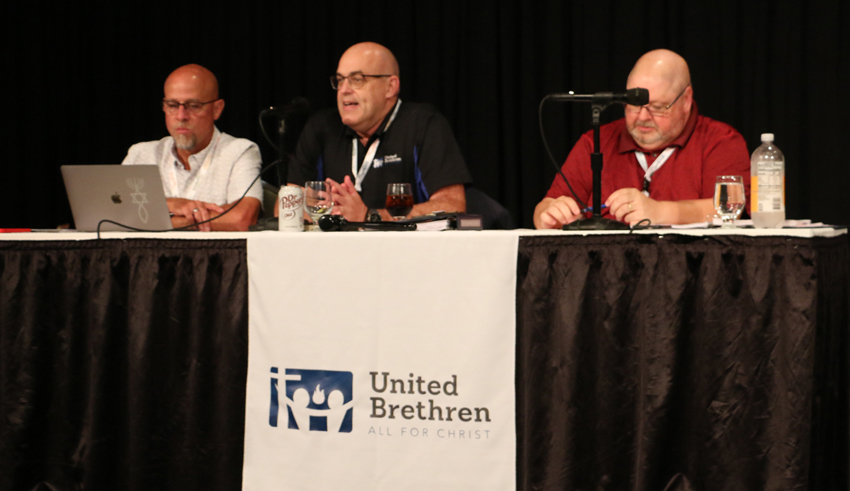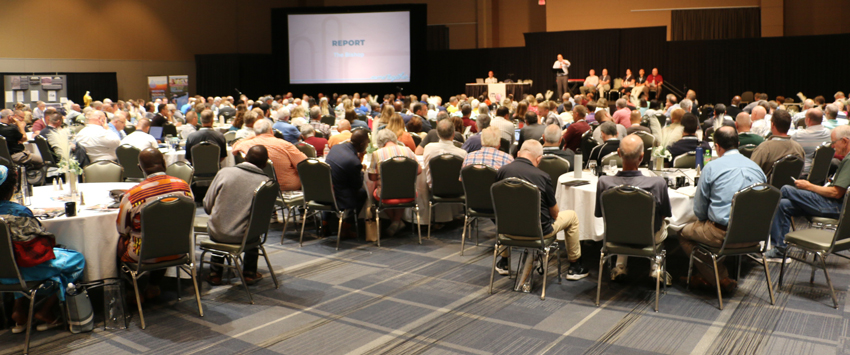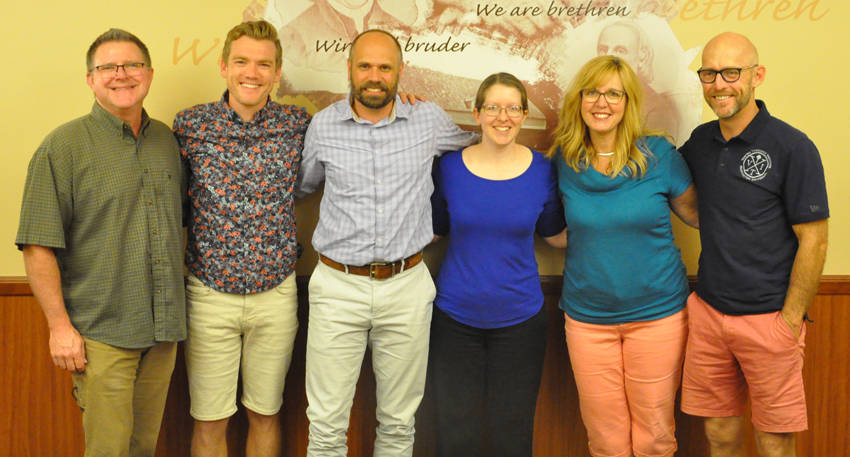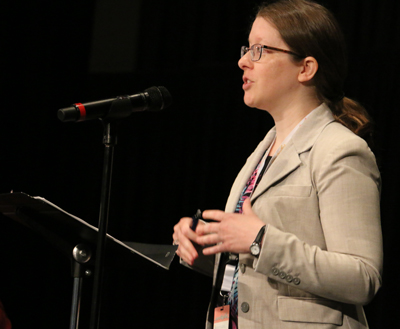09 Aug Adding 7 Significant Statements to the UB Discipline

Bishop Todd Fetters (center) chaired the US Conference. He is flanked by recording secretary Roxton Spear (left) and assistant chairperson Jim Bolich.

The US National Conference met on Wednesday, July 12, 2023, in Fort Wayne, Ind.
The 2023 US National Conference held its business meeting on July 12, with about 250 voting members who represented 104 United Brethren churches in the United States. The delegates adopted seven new statements proposed by the Human Reproduction Task Force (HRTF), which had been at work for over a year.
All seven statements were adopted as presented. Six of the statements passed with no discussion. The “Abortion” statement took more time, with four proposed amendments and a number of people speaking. However, each amendment in turn was voted down by a clear voice vote. There seemed to be no appetite for changing what the task force had written.
The United Brethren Discipline has now been updated with these seven new statements. Two of the statements, “Abortion” and “Family Planning,” are revisions of existing statements. The other five are entirely new…and significant.
On the Heels of the 2017 Task Force
The 2017 US National Conference passed six proposals from the Task Force on Human Sexuality, which was established in 2015 by the Executive Leadership Team. Bishop Todd Fetters then began considering the right time to do something similar on the issue of human reproduction. Our statements on Abortion, Family Planning, and Genetic Engineering hadn’t been revised since the 1980s. Bishop Fetters decided, “It was time for us to revisit these statements in light of the enormous scientific advancements that have occurred since the 1980s, and to find our voice for a new generation.”
In March 2022, the ELT appointed six persons to a Task Force on Human Reproduction. Bishop Fetters emphasized, as he had done with the 2017 task force, that there was no desire or appetite to liberalize our positions. In outlining the scope of the HRTF’s work, he directed them to three statements in the Discipline–Abortion, Family Planning, and Genetic Engineering. They took it from there.

L-r: Jody Bowser, Christopher Little V, Mark Vincenti, Joni Michaud, Kim Fish, Kent Eilers.
The Task Force Members
The Task Force members brought expertise from a variety of perspectives—legal, family, adoption, therapeutic services, the pastorate, personal experience, Bible/theology, UB missions, higher education, etc.
- Joni Michaud, chairperson, is a lawyer and a member of the Pleasant Valley UB church in Lake Odessa, Mich. She has also served on the ELT since 2019.
- Dr. Kent Eilers is a theology professor at Huntington University.
- Dr. Jody Bowser was senior pastor of King Street UB church in Chambersburg, Pa.; at the end of April 2023, he accepted a pastorate on the East Coast with another denomination.
- Rev. Mark Vincenti, an ordained UB minister from Emmanuel UB church in Fort Wayne, Ind., is the campus pastor at Huntington University.
- Kim Fish is a licensed UB minister, licensed social worker, adoptive parent, and individual/family therapist with a private practice in Fort Wayne, Ind. She grew up in the UB church as the daughter of Dr. Kent Maxwell, graduated from Huntington University, and is married to Rev. Steve Fish, a UB pastor and associate director of UB Global.
- Rev. Christopher Little V is a UB church planter in Harrisburg, Pa. He and his wife are adoptive parents.
Joni Michaud and Mark Vincenti had also served on the Task Force on Human Sexuality.
Taking it to the Church
The HRTF submitted their proposals to the Executive Leadership Team in April 2023. The proposals were embedded in a longer “white paper” which helped explain and give context to the proposals. Chairperson Joni Michaud then presented the proposals to the National Conference preview meetings held in Michigan, Indiana, Pennsylvania, and online.
The HRTF report stated, “While issues like abortion remain hotly contested in the wider culture, the general United Brethren position and scriptural basis for it are long-settled and well-established. In looking at the subjects of family planning, abortion, and genetic engineering, the primary focus of the task force was to propose revised language for the Discipline that would be both consistent with scripture and would remain relevant as science and technology continue to develop over time. This was particularly significant for the section on genetic engineering, which identifies procedures that are no longer in use and does not account for many developments in the field that have occurred during the last 35 years.”
These seven statements, along with about 20 other revisions to the Discipline (mostly minor) have now been incorporated into the Discipline. It can be downloaded here.
Following are the seven proposals as they appear in the Discipline.
¶133 The Beginning of Life
1. In human procreation, God invites us to participate in his good work of creation in a unique and significant way. Human life is God’s gift, and it is sacred at every stage from its end to its earliest beginning.
2. The Church bears living testimony to the sacredness of life by:
a. Promoting the flourishing of every person’s life through works of justice, mercy, and evangelism.
b. Standing with and for those whose lives are vulnerable. Never is a human life more vulnerable than during its beginning.
3. God values each human being in their full humanity at every stage of their life. Therefore, we are committed to promote human flourishing at every life stage and to protect the lives of all human persons through their entire life span beginning at the moment of conception. Scripture portrays this in at least four ways.
a. Every human is made a bodied person in the image and likeness of God (Genesis 1:26-27).
b. God provides for each person throughout the course of their life, regardless of accomplishments or faith, sustaining life by sending rain on the righteous and the unrighteous (Matthew 5:45).
c. God loves each and every human person, shown most clearly in God’s saving mission through the Incarnation of God the Son: “For God so loved the world that he gave his only Son” (John 3:16).
Joni Michaud presenting the task force proposals to the National Conference delegates.
d. God’s salvation entails the restoration and renewal of the whole person, shown through the full, authentic humanity of Jesus the Messiah (Hebrews 2:5- 18).
4. God’s people bear testimony to the sacredness of life by caring for pregnant women as well as the unborn. No other human relation shares the characteristics of a pregnant woman and the human life she carries: one life biologically dependent upon another human life, and neither life more intrinsically valuable than the other.
5. The physical, emotional, and spiritual needs of a pregnant woman are significant in the best of circumstances. These needs are even more acute in circumstances when pregnancy is the result of rape or incest, or when continuing a pregnancy places a woman’s life at risk. During such unimaginably difficult times, the Church envisions and strives to embody the love and tenderness of God for the weak and the vulnerable just as it does when promoting and protecting the lives of the unborn.
¶134 Family Planning
1. Children are a gift from the Lord. We recognize the family as an environment of unique nurture and support in which all members together pursue their calling in Christ Jesus.
2. Children may be received into the family in a variety of ways, including natural conception, assisted reproduction, adoption, and foster care. These aspects of reproduction and growing families are some of the deepest and most meaningful aspects of our lives. In this light, they can also be the most painful, complex, and difficult.
3. Believers may for valid reasons determine not to have children, or to place a child for adoption. For those who choose to have children, if there is a desire to time pregnancies or to space children a certain number of years apart, that is a decision parents are free to make, and through prayer and discernment they may wisely plan for the addition of any children God blesses them with. (Proverbs 16:3; James 1:5)
¶135 Adoption and Foster Care
1. As believers we have the privilege of being adopted into the family of God.
2. In scripture we see the heart of God for the fatherless and are told to fight and care for the orphan (Psalm 146:9). The church is encouraged to do this, in parenting or support roles. Valuable avenues to family growth may include embryo, private, international and domestic adoption, and foster care.
3. Often there is some aspect of loss and tragedy included in situations of adoption and foster care, and the responsibility to provide care can be challenging and difficult. The church is encouraged to be equipped, and offer emotional and financial support as they are able, in providing for the needs of these children and parents (Isaiah 1:17). In doing so, Jesus’ value of children is lived out, and is considered the same as caring for Jesus himself (Matthew 18:1-6).
¶136 Infertility
1. We recognize the pain and grief that accompanies infertility and empathize with couples affected by it.
2. Couples affected by infertility may request the elders gather together to lay hands on them to pray for healing (James 5:14).
3. Infertile couples are advised to seek the wisdom of the Holy Spirit (James 1:5) and supportive church community in moving forward with faith in considering methods to welcome children into their family, including assisted reproductive technology, adoption, and foster care.
¶137 Assisted Reproduction
1. Assisted reproduction includes the use of medical procedures or technology to aid human procreation.
2. The use of assisted reproductive technology may take a variety of forms, which will necessarily change as new procedures develop. Therefore, rather than addressing the nature of specific procedures, the church advises its members to prayerfully consider the following guidelines when deciding whether to make use of assisted reproductive technology:
a. Its use should be motivated by love.
b. Its use should bring glory to God.
c. Its use should protect and preserve life from the moment of conception.
d. Its use should promote justice toward and prevent the exploitation of each person involved in the process.
e. Its use should protect the integrity of the family.
¶138 Abortion
1. We believe that human life is sacred from the moment of conception until natural death. Consequently, abortion cannot be recognized morally and scripturally as a means of birth control.
2. We are aware that any consideration of abortion occurs in a place of crisis and significant consequence, and that forgiveness is available in Christ.
3. The church recognizes that abortion may be medically necessary in rare and tragic circumstances, taking into account the life of the mother and baby.
4. The church needs to demonstrate sensitivity and care toward those who have had abortions in the past in order to facilitate an atmosphere of grace and healing.
¶139 Human Reproduction and the Responsibility of the Church
1. Scripture is clear that God’s church is responsible to bring Jesus’ love, light, hope, and healing to people who are hurting, struggling, and in need while also maintaining deeply biblical convictions about human life and reproduction. These two convictions are not in conflict. They are to be simultaneously embraced and held in creative tension in order for the Church to be a faithful witness to the world.
2. We understand that a deep range of emotions pertain to reproductive issues. The Church’s commitment is to:
a. Be a generous support in bearing the burdens of those in trial or crisis (Gal. 6:2; Rom 12:15).
b. Show extravagant welcome (Romans 12:13; 15:7), companionship (Romans 12:10), and sacrifice (Hebrews 13:16) to those in need.
3. While maintaining our compassion and support for people during difficult and often confusing reproductive crises, we must always maintain our commitment to the authority of Scripture (Isaiah 40:8, 2 Timothy 3:16). At times this may necessitate embracing convictions that contrast with prevailing cultural and social norms and rejecting certain reproductive technologies or procedures.
4. It is our high view of God’s gift of life (Psalm 139:13-16), the sacredness of the human body (Genesis 1:26-27), and the beauty of God’s design of human reproduction (Genesis 1:28, 2:23-24) that compels us to maintain and celebrate our biblical convictions about human reproduction as we care for and value the least of these.


No Comments